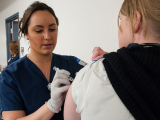Jun 14, 2010
China calls for more H5N1 precautions
The recent H5N1 avian influenza death of a Chinese woman prompted the country's health ministry on Jun 12 to urge authorities at all government levels to boost their prevention and control measures, especially as southern China enters the most active part of its flu season, reported Xinhua, China's state news agency, yesterday. The central government asked localities, including Shanghai and Guangzhou, which are hosting international gatherings, to develop emergency plans in the event of a flu outbreak. It asked health officials to report cases of unusual pneumonia quickly and to be ready to deploy equipment and medications in the event of an outbreak.
Jun 13 Xinhua story
Case study describes rare H5N1-HIV coinfection
In what appears to be only the second case report of a coinfection with H5N1 avian influenza and human immunodeficiency virus (HIV), Vietnamese researchers described the clinical course of a 30-year-old Vietnamese man who got sick with the H5N1 virus after eating the only surviving duck from a flock that suddenly died. They reported their findings today in BMC Infectious Diseases. The man was hospitalized on the fourth day of his illness, tested positive for both infections, and treated with oseltamivir (Tamiflu) and broad-spectrum antibiotics. Though he seemed to improve and showed virus clearance by day 6, his condition deteriorated on day 10 and he died on day 16. The researchers concluded that the clinical course of his H5N1 infection was not atypical despite his HIV infection, but his illness and CD4 T-cell depletion could have made him more susceptible to secondary infection. They concluded that CD4 cells may not be necessary to clear the H5N1 virus.
Jun 14 BMC Infectious Diseases study
South Korea finds more H7N7 on duck farms
South Korea's agriculture ministry recently reported four more low pathogenic H7N5 avian influenza outbreaks on duck farms in two provinces in the southern part of the country, Cholla Namdo and Cholla Bukdo, according to a Jun 4 report from the World Organization for Animal Health (OIE). The outbreaks started between May 18 and May 25. In total, 32,882 birds were culled to control spread of the virus. Veterinary officials found the virus on the farms in their investigation of sites with epidemiologic links to a different outbreak at two other duck farms in Cholla Namdo province in early May. Investigators haven't yet determined the source of the outbreaks.
Jun 4 OIE report
Central European vaccine advisors push universal flu vaccination for kids
A group that advises central European countries on vaccination schedules has adopted a universal flu recommendation for all children aged 6 months and older, according to a report today in BMC Infectious Diseases. The Central European Vaccination Advisory Group (CEVAG) that made the recommendations comprises experts from Bulgaria, Croatia, the Czech Republic, Estonia, Hungary, Lithuania, Poland, Romania, Slovenia, and Turkey. They said vaccinating healthy children against seasonal flu in Europe is not widespread—only six countries advise routine seasonal flu vaccination for children. However, the group said evidence shows the strategy can reduce the disease's health and economic burdens. CEVAG members advised countries to focus on children younger than 60 months old because they are at greatest risk, and they urged each country to decide how best to implement their recommendation, based on individual circumstances.
Jun 14 BMC Infectious Diseases report



















